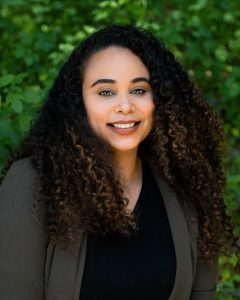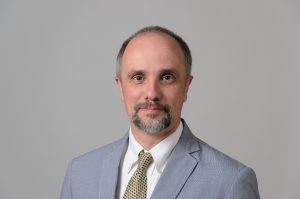Santos and Paricio Advance Inclusion at the School of Engineering
In the summer of 2021, Dr. Stephany Santos was appointed the inaugural Executive Associate Director of the Vergnano Institute for Inclusion in UCONN’s School of Engineering. Santos holds Bachelor’s, master’s, and Doctoral degrees in Biomedical Engineering from UCONN as well as an M.S. Mechanical Engineering from the Politecnico di Milano in Italy. During her ti -me as a Ph.D. student, Stephany was an EAGLES Fellow, an NSF GK-12 Fellow, an NSF ACADEME Fellow, a CU Boulder ACTIVE Faculty Development and Leadership Fellow, an Outstanding Multicultural Scholar/Crandall- Cordero Fellow, and won a prestigious Ford Foundation Fellowship from the National Academies. Additionally, she was the inaugural recipient of the Inspiring STEM Equitability Award and a Woman of Innovation by the Connecticut Technology Council. Stephany has presented on her work in diversity and outreach in numerous national forums and has contributed as a team member or collaborator on numerous NSF-funded research studies on diversity and outreach topics.
-me as a Ph.D. student, Stephany was an EAGLES Fellow, an NSF GK-12 Fellow, an NSF ACADEME Fellow, a CU Boulder ACTIVE Faculty Development and Leadership Fellow, an Outstanding Multicultural Scholar/Crandall- Cordero Fellow, and won a prestigious Ford Foundation Fellowship from the National Academies. Additionally, she was the inaugural recipient of the Inspiring STEM Equitability Award and a Woman of Innovation by the Connecticut Technology Council. Stephany has presented on her work in diversity and outreach in numerous national forums and has contributed as a team member or collaborator on numerous NSF-funded research studies on diversity and outreach topics.
A second recent hire working to improve inclusion in the School of Engineering is the Krenicki Arts and Engineering Institute’s Co-Director, Dr. Jorge Paricio Garcia. The Krenicki Institute was established with a major gift to UCONN by John and Donna Krenicki, with the aim of establishing an innovative interdisciplinary curriculum in areas like entertainment engineering and industrial design. Paricio received his bachelor’s degree from the Complutense University of Madrid, followed by a master’s in industrial design from the Pratt Institute and a PhD from the Complutense University, with a dissertation on Freehand Drawing in Industrial Design. He taught at the Rhode Island School of Design, Ohio University, The Art Institute of Pittsburgh, The Art Institute of Colorado, Pratt Institute and Parsons School of Design. He has practiced product design and exhibit design in New York City, Denver and Madrid, Spain, and has helped write patents and developed concepts for Colgate Palmolive among other companies. He has written two books, Perspective Sketching and Hybrid Drawing Techniques for Interior Design.
established with a major gift to UCONN by John and Donna Krenicki, with the aim of establishing an innovative interdisciplinary curriculum in areas like entertainment engineering and industrial design. Paricio received his bachelor’s degree from the Complutense University of Madrid, followed by a master’s in industrial design from the Pratt Institute and a PhD from the Complutense University, with a dissertation on Freehand Drawing in Industrial Design. He taught at the Rhode Island School of Design, Ohio University, The Art Institute of Pittsburgh, The Art Institute of Colorado, Pratt Institute and Parsons School of Design. He has practiced product design and exhibit design in New York City, Denver and Madrid, Spain, and has helped write patents and developed concepts for Colgate Palmolive among other companies. He has written two books, Perspective Sketching and Hybrid Drawing Techniques for Interior Design.
“Words like ‘inclusion’,” says Paricio, “which in past times might have escaped the post-secondary educational system, now are key elements that guide new curricula.” That concern with inclusion is reflected in the new coming multidisciplinary degrees in engineering (MDE) at UConn, which will offer courses such as Asian Theater and Performance, African American Theater and Latinx Theater, among others. The Vergnano Institute has pledged its support in one of the new classes, Multicultural Design and Diversity, in the industrial design specialization in MDE. The emphasis throughout the new curriculum is on complementing technical mastery with the soft skills that engineering students need to master, to design gender-inclusive products, or offer services or experiences that cater to a wider cast of users and including minority groups.
In the summer of 2021, Paricio consulted with El Instituto’s Director, Samuel Martínez, in preparing a report that set forward a need for a more inclusive environment, aiming especially at bringing in more first-generation, and lower-income (FiGLI) Latinx students and helping them succeed in its sponsored programs, and many other STEM programs at UConn. While undergraduate Engineering students are approximately 11% Latina/o/x, that enrolment figure drops to a slim 4% in Graduate Engineering programs. The Vergnano and Krenicki initiatives seek to raise that student of color percentage in Graduate studies, with the help of internal and external funding opportunities for scholarships, possibly including bridge and exchange programs with Hispanic Serving Institutions, and with other programs created in conjunction with El Instituto. With a more solid platform of support, more graduate students of color will flourish in UCONN Engineering and ultimately make meaningful contributions at their places of work, in their communities and in society at large.
Contributed by Prof. Jorge Paricio, PhD